

Recherches préparatoires à une histoire de l’épistémologie des sciences humaines. 1 Texte révisé d’une leçon donnée à l’Université de Genève, Groupe d’étude d’histoire moderne et cont (...) 1Depuis l’époque des penseurs Grecs, la notion de preuve demeure au centre de la réflexion des épistémologues et des historiens des sciences.
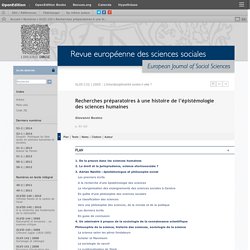
Des nombreux livres en retracent l’historique, informent sur les problématiques du passé et du présent, d’Aristote à Wittgenstein, de Kuhn à Stich. Bien que ces travaux n’aient exercé qu’une influence négligeable sur les praticiens des sciences humaines, il est profitable de prendre pour point de départ les définitions de la preuve qu’ils attribuent aux sciences « dures » et à celles dites « molles » 2 Selon le professeur Jean-Blaise Grize (lettre du 2 mars 2004) il faut distinguer les preuves des dé (...) 2Dans les sciences « dures » (formelles et expérimentales), la preuve est un test, un procédé d’évaluation, de validité, une construction inférentielle présumée correcte si les prémisses initiales impliquent la conclusion.
Constructivism and Online Learning. My notes from: Huang, H. (2002).
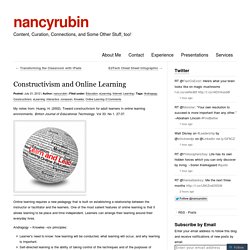
Toward constructivism for adult learners in online learning environments. British Journal of Educational Technology. Vol 33. No 1. 27-37. Online learning requires a new pedagogy that is built on establishing a relationship between the instructor or facilitator and the learners. Andragogy – Knowles –six principles: Learner’s need to know: how learning will be conducted, what learning will occur, and why learning is important.Self-directed learning is the ability of taking control of the techniques and of the purposes of learning.Then, prior experience of the learner impacts learning in creating individual differences, providing rich resources, creating biases and providing adults’ self-identity.Readiness to learnOrientation to learning – adults prefer problem-based learningMotivation to learn – adults have a high motivation to learn when they can gain new knowledge to help them solve important problems in their lives. Constructivism - Learning and Teaching. Constructivism is a learning theory found in psychology which explains how people might acquire knowledge and learn.
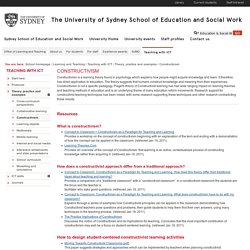
It therefore has direct application to education. The theory suggests that humans construct knowledge and meaning from their experiences. Constructivism is not a specific pedagogy. Piaget's theory of Constructivist learning has had wide ranging impact on learning theories and teaching methods in education and is an underlying theme of many education reform movements. Research support for constructivist teaching techniques has been mixed, with some research supporting these techniques and other research contradicting those results.
Resources. Constructivism. The Web as a classroom is transforming how people learn, is driving the need for new pedagogy; two recently launched courses at Coursera highlight what happens when pedagogical methods fail to adapt.
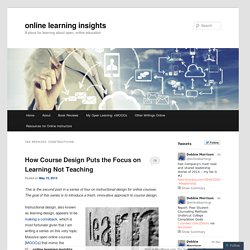
Divided pedagogy I wrote recently about the Fundamentals of Online: Education [FOE] the Coursera course that was suspended after its first week and is now in MOOC hibernation mode. Over thirty thousands students signed up for the course hoping to learn how to develop an online course. It was a technical malfunction when students were directed to sign-up for groups through a Google Doc that shuttered the course, along with hundreds of student complaints about lack of clear instructions, and poor lecture quality.
The course was suspended on February 2, and there has been no word yet as to when it will resume :(. Petit glossaire: Terminologie et mots-clé autour du constructivisme - e-learning concepts. Using Instructional Design to Implement Constructivist E-Learning - Learning Theory and Educational Technology. Heather Smith Boise State University Abstract Constructivist learning activities help create a sense of community necessary to student engagement in an e-learning environment.
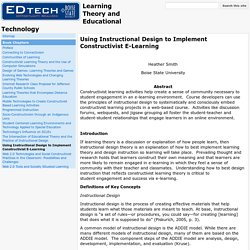
Course developers can use the principles of instructional design to systematically and consciously embed constructivist learning projects in a web-based course. Activities like discussion forums, webquests, and jigsaw grouping all foster the student-teacher and student-student relationships that engage learners in an online environment. Www.canterbury.ac.uk/support/learning-teaching-enhancement-unit/publications/FLT-briefing-notes/e-learning-and-constructivism.pdf.
Constructivism (philosophy of education) Jean Piaget: founder of Constructivism In past centuries, constructivist ideas were not widely valued due to the perception that children's play was seen as aimless and of little importance.
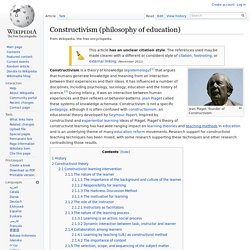
Jean Piaget did not agree with these traditional views, however. He saw play as an important and necessary part of the student's cognitive development and provided scientific evidence for his views. Today, constructivist theories are influential throughout much of the non-formal learning sector. One good example of constructivist learning in a non-formal setting is the Investigate Centre at The Natural History Museum, London. For more detailed information on the philosophy of the construction of human knowledge, see constructivist epistemology. Formalization of the theory of constructivism is generally attributed to Jean Piaget, who articulated mechanisms by which knowledge is internalized by learners. Volume5/IJELLOv5p091-109Koohang655.pdf. #Change11 Connectivism and Constructivism – similarities and differences Part 2.
I found Jenny’s post thought provoking, and so this is a follow up post on my previous one relating to Connectivism & Constructivism – What’s similar and different.
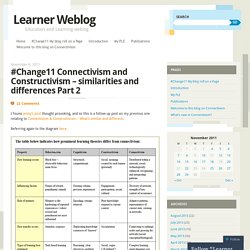
Referring again to the diagram here. How learning occurs: What may happen is that social, meaning created by each learner (personal) could actually happen in a distributed network. However, social doesn’t necessarily mean it would be within a virtual or digital space, or network, as it could happen in a space that once conceived to be navigation across networks. I have reflected in my Intelligent and Dark side of Blogging, that: Connectivism versus Constructivism. Connectivism versus Constructivism. What is a Constructivist MOOC? Lisa Lane describes three kinds of MOOCs here.
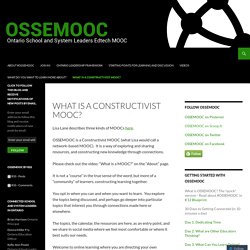
OSSEMOOC is a Constructivist MOOC (what Lisa would call a network-based MOOC). It is a way of exploring and sharing resources, and constructing new knowledge through connections. Please check out the video: “What is a MOOC?” Evanoff, Richard J., "Reconciling Realism and Constructivism in Environmental Ethics" Www.idrinstitute.org/allegati/IDRI_t_Pubblicazioni/34/FILE_Documento_Evanoff-Intercultural_Ethics.pdf. Stefan Neubert, Pragmatism, constructivism, and the theory of culture. John Dewey Between Pragmatism and Constructivism - Hardcover - Larry Hickman; Stefan Neubert; Kersten Reich - Oxford University Press. "This book is a unique collaboration by leading scholars of Dewey on both sides of the Atlantic.

The contributors illuminate theoretical resonance, and dissonance, between classical pragmatism and contemporary constructivism. "-David T. Hansen, Teachers College, Columbia University "This tidy volume marks a milestone in the ongoing efforts of Larry Hickman to advocate for Deweyan pragmatism as a world philosophy. Like John Dewey himself-a social and political reformer on the international stage-Dewey's version of pragmatism is transactional, pluralistic, and resolutely cosmopolitan. "The planetary reach of John Dewey's thought comes alive in this trenchant discussion of his epistemology and philosophy of education.
"A substantial contribution to the theoretical literature on constructivism and Dewey's pragmatismDLhighly readable and lively debate that should provoke stimulating discussion among philosophers. " Www.uni-koeln.de/hf/konstrukt/texte/download/neubert_some perspectives.pdf. Kersten Reich (Editor of John Dewey Between Pragmatism and Constructivism)
Www.pragmatismtoday.eu/winter2013/15 Mougan.pdf. Kersten Reich, Constructivism : Diversity of approaches and connections with pragmatism. "Interactive Constructivism in Education" by Kersten Reich. Abstract Interactive constructivism and its implications for education will be introduced in four steps. (1)The context of the approach and its relation to other constructivist developments will be discussed. (2)I will examine essential pragmatic criteria in the tradition of John Dewey that are relevant for interactive constructivism. (3)More decisively than Dewey interactive constructivism launches a meta-theoretical distinction between observers, participants, and agents. (4)Communication as a chief dimension of education can be analyzed out of three perspectives: the symbolic, the imaginative, and the real.
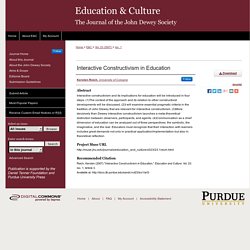
Educators must recognize that their interaction with learners includes great demands not only in practical application/implementation but also in theoretical reflection. Project Muse URL. Interactive Constructivism in Education. Find using OpenURL Rent from DeepDyve Interactive Constructivism in Education Abstract Interactive constructivism and its implications for education will be introduced in four steps. (1) The context of the approach and its relation to other constructivist developments will be discussed. (2) I will examine essential pragmatic criteria in the tradition of John Dewey that are relevant for interactive constructivism. (3) More decisively than Dewey interactive constructivism launches a meta-theoretical distinction between observers, participants, and agents. (4) Communication as a chief dimension of education can be analyzed out of three perspectives: the symbolic, the imaginative, and the real.
Educators must recognize that their interaction with learners includes great demands not only in practical application/implementation but also in theoretical reflection. The Challenge of Pragmatism for Constructivism: Some Perspectives in the Programme of Cologne Constructivism. Find using OpenURL Rent from DeepDyve The Challenge of Pragmatism for Constructivism: Some Perspectives in the Programme of Cologne Constructivism Abstract In this paper1 we wish to give a short introduction to the programme of interactive constructivism, an approach founded by Kersten Reich and under further development at the University of Cologne.2 This introduction will be combined with a discussion about the importance of pragmatism as a source of a socially oriented constructivism.
For the Cologne programme, especially the philosophy of John Dewey has been very helpful in this respect.3 We will try to show this relation in two main steps. Please allow us to use a somewhat unconventional form of talk for this purpose. Www.uni-koeln.de/hf/konstrukt/reich_works/aufsatze/reich_50.pdf. Universalist, relativist, and constructivist approaches to intercultural ethics. Richard J. Evanoff, School of International Politics, Economics, and Business, Aoyama Gakuin University, 4-4-25 Shibuya, Shibuya Ku, Tokyo 150-8366, Japan Available online 28 September 2004 Choose an option to locate/access this article: Check if you have access through your login credentials or your institution Check access. Stefan Neubert. Kersten Reich. The Learner Collection » The Ethnocentric View: Constructivism and the Practice of Intercultural Discourse. By Stefan Neubert and Kersten Reich. Published by The Learner Collection Enquires whether constructivism is able to evade what in intercultural studies is called the ethnocentric view.
International Journal of Learning, Volume 8. Www.as.tu-berlin.de/fileadmin/fg225/material_knoblauch/comcultengl.pdf. Edited by Aldo Di Luzio, Susanne Günthner and Franca Orletti [P&bns 81] John Benjamins Publishing Company. Sorry, this page relies on JavaScript which is not enabled in your browser. Please enable JavaScript or view the <a href="/catalog">browsable version</a>. Home▼New▼Catalog▼Online Resources▼Customer Services▼For Authors▼JB Antiquariat ▸▼ E-newsletter Subscribe to our E-newsletter Shopping Cart Your shopping cart is empty Wishlist Your wishlist is empty.
The Application of Constructivism to the Teaching of Intercultural Communication. The Application of Constructivism to the Teaching of Intercultural Communication Lin Liu, Ying Zhang Abstract Cultivating intercultural communicative competence is not a process in which teachers transmit knowledge to students, but one in which students construct their intercultural communicative competence on their own initiative. By applying the constructivist theory to the teaching of intercultural communication, the author designs a model of teaching intercultural communication and elaborates the procedure in detail. This model aims to facilitate students’ construction of their intercultural communicative competence effectively.
Constructivist Foundations of Intercultural Education: Implications for Research and Teacher Training. This is a peer review book. Each paper is reviewed by two editors – the relevant parteditor and the editor-in-chief. Intercultural Development Research Institute - Resources - Constructivist Intercultural Communication. Www.idrinstitute.org/allegati/IDRI_t_Pubblicazioni/12/FILE_Documento.pdf. Intercultural Development Research Institute - Home. Intercultural Development Research Institute - IDRAcademy - Curriculum - Constructivist Intercultural Communication. Applying the New Paradigm Course Description Intercultural communication is a young field, born into the newly relativistic mid-20th century. It addressed the then-new question, "if you have your own worldview, and I have mine, how can we understand each other? " Early interculturalists gave a powerful answer to that question: we must construct a bridge between them.
Modèle de développement de la sentibilité interculturelle by stephanie girouard. Www.unige.ch/fapse/publications-ssed/files/7614/1572/5497/intro_APPINT.pdf. Www.cilta.unibo.it/NR/rdonlyres/B5BB35F1-B9D6-40B2-A3D1-4C6DD8179BA1/209245/Hamon1.pdf. Des modèles pédagogiques interculturels grâce aux TIC. Claire Belisle, ingénieure de recherche au CNRS (France) en sciences humaines et sociales, québécoise d'origine, connaît bien les questions liées à l'interculturalité et celles qui ont trait à la mise en place de parcours de formation à distance.
Elle a publié en 2008 un long article intitulé "eLearning and intercultural dimensions of learning theories and teaching models", dans la série des eLearning papers publliés par la Commission européenne. Au-delà des compétences linguistiques, des compétences interculturelles. Www.aidenligne-francais-universite.auf.org/IMG/pdf_Blanchet_inter.pdf. Journal.psy.ulaval.ca/ojs/index.php/ARIRI/article/viewFile/Gajardo_Alterstice1(1)/pdf. Les perspectives constructivistes et constructionnistes de l’identité (2e partie) 1La transformation du monde du travail vers la complexification, l’abstraction et la globalisation a bouleversé les façons de penser l’orientation des individus et de pratiquer le conseil d’orientation. Les modèles théoriques et les méthodes du 20e siècle s’avèrent aujourd’hui inadéquats. Examinons les critiques les plus fréquentes de ces modèles traditionnels dont Campbell et Ungar (2004) dressent une liste que nous reprenons à notre compte parce qu’elle trace en creux les caractéristiques souhaitables pour une alternative.
Une première critique récurrente est que les approches traditionnelles du conseil sont réductrices, normatives, décontextualisées et réactives, donc inadaptées face aux enjeux actuels de l’aide à des individus en développement dans un monde du travail en changement. Pourquoi des approches interculturelles en sciences de l'éducation ? - P. R. Dasen. Www.irfam.org/assets/File/integra_int_frot.pdf. Www.faitesladifference.org/akkari/documents/TexteMartel.pdf. Www.unifr.ch/ipg/aric/assets/files/ARICManifestations/2001Actes8eCongres/TroadecB.pdf. L’interculturel et les pièges des interactions en milieu professionnel. Après la présentation des diverses acceptions du concept d’« interculturel », l’article précise son option sémantique, issue de la réconciliation du paradigme positiviste et de celui de type constructiviste.
En gros, la première perspective articule la connaissance de l’Autre dans un discours sur l’Autre (perçu comme membre d’une communauté) et valorise ainsi en priorité les savoirs (modèles) culturels. Constructivisme: Choix Contemporains: Hommage à Ernst Von Glasersfeld. Constructivism in Education. ECOLOGY OF MIND Ernst von Glasersfeld.
Jean Piaget – L'œuvre. Recherches sur la formation du symboleImage et opération: position du problèmeMéthodologieBilan des recherches Recherches sur la formation du symbole Les travaux sur l’image mentale réalisés dans les années soixante avec Bärbel Inhelder s’inscrivent naturellement dans la construction de l’oeuvre. Des recherches sur les origines de l’image avaient déjà été réalisées par Piaget vers le début des années trente, c’est-à-dire avant les études sur les notions et les structures opératoires caractéristiques de la pensée concrète. Les premières recherches sur l’image avaient plus précisément été réalisées dans le contexte des travaux sur les débuts de la fonction symbolique chez l’enfant (JP45).
Www.fondationjeanpiaget.ch/fjp/site/textes/VE/JP_45_op_log_viesoc.pdf. Persée : Portail de revues en sciences humaines et sociales. Www.sftf.net/upload/dossiers/pdf/bateson_epistemologie.pdf. Le constructivisme. Théorie de la connaissance de Kant. Épistémologie de la sociologie: Paradigmes pour le XXIe siècle. Biblionet - Le constructivisme, Jean-Louis Lemoigne - présentation par Jean-Paul Baquiast. 9 avril 2004 Notes par Jean-Paul Baquiast Le constructivisme Ce texte a été relu par l'auteur, que nous remercions. LE MOIGNE Jean-Louis. – Les Épistémologies constructivistes. Le constructivisme comme outil de pouvoir aux mains des intellectuels. MICHEL FOUCAULT ET LE CONSTRUCTIVISME - Le blog de nouvellesociologie.over-blog.org. Constructivisme. Constructivisme. Le constructivisme. E-edu.nbu.bg/pluginfile.php/147641/mod_resource/content/0/Le_constructivisme.pdf.
Le réalisme au défi du constructivisme. Constructivisme (épistémologie) Jean Piaget. Silvio Ceccato. 132.pdf. Radical Constructivism Portal. Ernst von Glasersfeld. 034.pdf. John Dewey. Www.univie.ac.at/constructivism/EvG/papers/055.pdf. Humberto Maturana. Max.kistler.free.fr/articles/MK26.pdf. Soyons réalistes (demandons l’impossible ?) Xénophane. Social constructivism pdf. Pubs/nile_a_190834_o.pdf. Folk.uio.no/sveinsj/Constructivism_and_learning_Sjoberg.pdf. People.uncw.edu/huberr/constructivism.pdf. Social constructivism. TECHNOLOGICAL DETERMINISM vs SOCIAL CONSTRUCTION OF TECHNOLOGY. Www.nyu.edu/projects/nissenbaum/papers/openingblackbox.pdf. Social constructionism of technology. Www.utwente.nl/bms/wijsb/organization/brey/Publicaties_Brey/Brey_1997_Social-Constructivism_PoT.pdf.
Social construction of technology. Wp-content/uploads/2012/06/WhatisSocialConstructionismVol111.pdf. Gsueds2007.pbworks.com/f/Palinscar1998.pdf. Theory/Constructivism as Educational Theory.pdf. Socio-constructivisme. Concept du socio-constructivisme - Rp70110. Constructivist Foundations.
Constructivisme social. Constructivist epistemology.